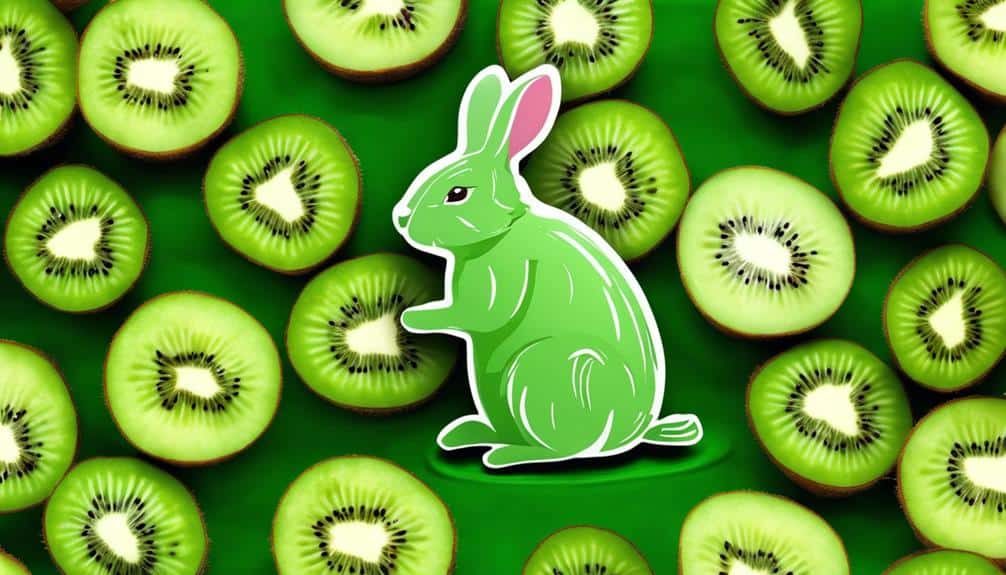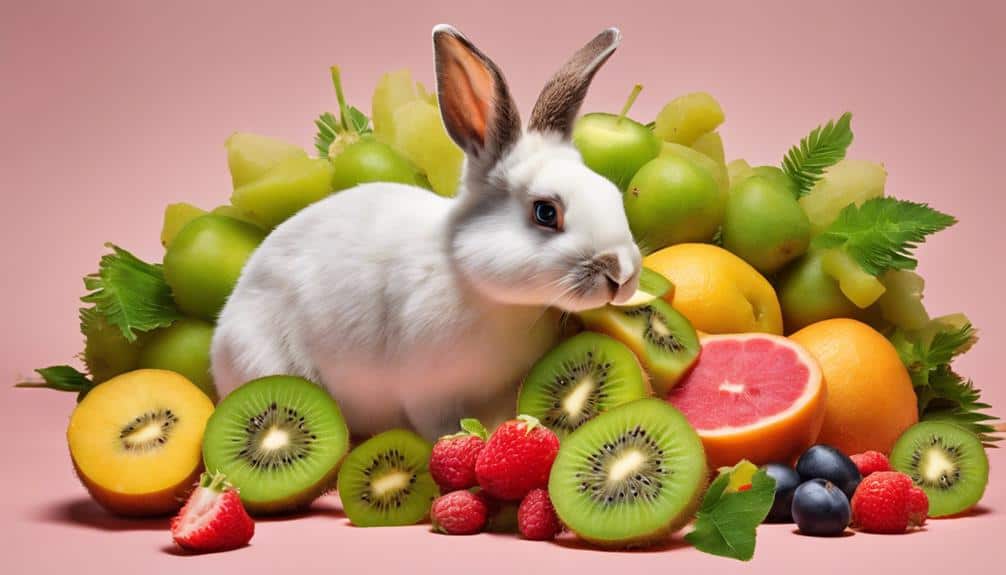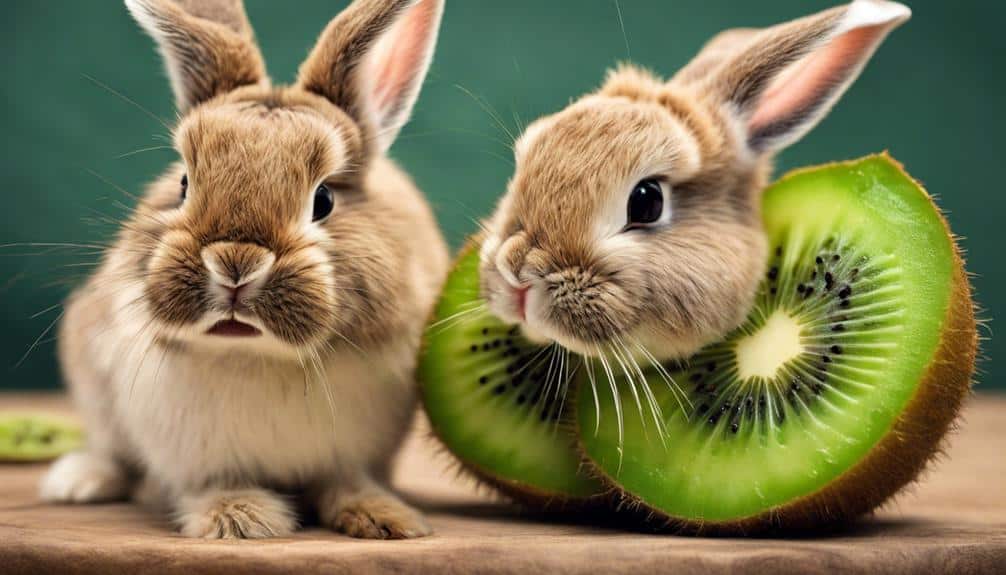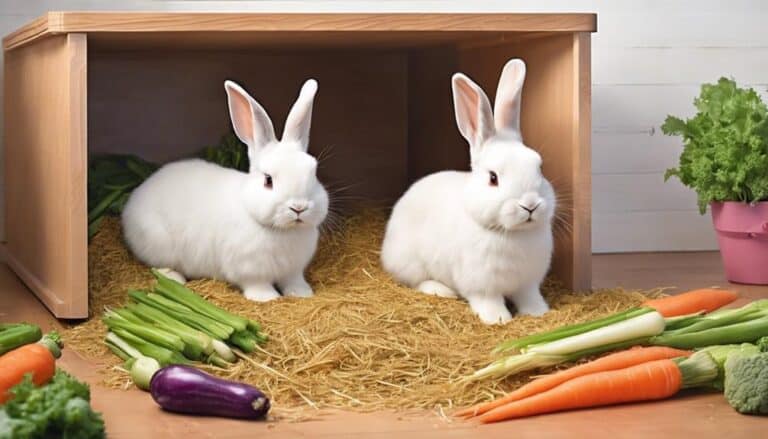If you're wondering if bunnies can eat kiwi, the answer is yes, they can. However, it's important to think about the sugar content in kiwi and how it fits into your bunny's diet.
But before you rush to offer this fruit to your furry friend, there are a few important factors to keep in mind that can impact their health and well-being.
Understanding the nutritional benefits, risks, and safe practices when feeding kiwi to bunnies is essential for their overall care and happiness.
Contents
Key Takeaways
- Kiwi can be a nutritious occasional treat for bunnies due to its Vitamin C and fiber content.
- Caution is needed to prevent digestive issues like diarrhea and stomach pains from high sugar levels.
- Supervise bunnies to avoid choking on kiwi seeds and watch for allergic reactions.
- Moderation is key; offer small, prepared slices of kiwi to ensure safe consumption for bunnies.
Nutritional Benefits of Kiwi for Bunnies

Kiwi provides a range of essential nutrients that can benefit a bunny's health, making it a valuable addition to their diet. This fruit is rich in Vitamin C, offering 92mg per 100-gram serving, which is crucial for a rabbit's overall well-being.
Additionally, with 3g of fiber per 100g, kiwi can support a rabbit's digestive system, promoting healthy gut function. Kiwi also contains important nutrients like Vitamin K and Folate, contributing to a well-rounded diet for bunnies.
Despite having 9g of sugars per 100g, kiwi can still be a nutritious occasional treat for rabbits when given in moderation. Additionally, at 61 kcal per 100g serving, kiwi can provide energy and a variety of vitamins that are beneficial for a bunny's health.
Including kiwi in your rabbit's diet can offer nutritional benefits and enrich their overall well-being.
Risks of Feeding Kiwi to Bunnies
Feeding kiwi to bunnies poses risks such as potential digestive issues, including diarrhea and stomach pains. The fruit's small seeds could also present a choking hazard to rabbits.
Additionally, some bunnies may have allergic reactions to kiwi, further emphasizing the importance of caution when introducing this fruit into their diet.
Digestive Issues in Bunnies
When considering the potential risks of introducing certain fruits into a bunny's diet, digestive issues can arise, particularly with high-sugar options like kiwi. Kiwi's high sugar content can lead to problems like diarrhea and stomach pains in bunnies. Excessive consumption of kiwi may even contribute to GI stasis in rabbits, causing trapped gas and posing health risks.
It's important to only offer bunnies small amounts of kiwi occasionally to prevent digestive disturbances and maintain their well-being. Keep a close eye on your rabbit's response to kiwi intake, watching for signs such as lethargy or changes in stool. If your bunny experiences any digestive problems after consuming kiwi, seeking veterinary assistance promptly is advisable to ensure proper care and treatment.
Potential Choking Hazard
To reduce the risk of potential choking hazards, closely monitoring your bunny while they consume kiwi is essential. Kiwi seeds are small and could pose a choking hazard for rabbits if not chewed properly. Rabbits may accidentally swallow kiwi seeds whole, increasing the risk of choking. It's important to avoid feeding large chunks of kiwi to your rabbit to reduce the chances of choking incidents. Always supervise your bunny when giving them kiwi to guarantee safe consumption and prevent any choking. Below is a table summarizing the key points regarding the potential choking hazard when feeding kiwi to bunnies:
| Risk Factor | Description | Importance Level |
|---|---|---|
| Kiwi seeds size | Small seeds can lead to choking | High |
| Swallowing whole | Rabbits might swallow seeds whole | High |
| Choking prevention | Close monitoring while eating kiwi | High |
Allergic Reactions in Bunnies
Introducing kiwi to your bunny should be approached cautiously due to the potential risks of allergic reactions. While allergic reactions to kiwi in bunnies are uncommon, they can manifest as symptoms such as gastrointestinal upset, itching, or lethargy.
It's important to introduce kiwi gradually into your bunny's diet and carefully monitor for any adverse reactions. Each rabbit may react differently to kiwi, so observing your bunny closely is vital. If you suspect that your rabbit is experiencing an allergic reaction to kiwi, it's recommended to seek guidance from a veterinarian promptly.
Being vigilant and attentive to any signs of allergies can help assure the well-being of your furry friend when considering incorporating kiwi into their diet.
How to Safely Prepare Kiwi for Bunnies
For best safety when preparing kiwi for your bunny, it's essential to thoroughly wash the fruit to remove any pesticides or dirt. Additionally, it's important to peel the skin off the kiwi before offering it to your rabbit. The skin can be tough and fibrous, making it difficult for your bunny to digest.
After washing and peeling the kiwi, cut it into small, manageable slices or pieces. This preparation will make it easier for your bunny to consume the fruit without any issues. Start by offering a small trial amount of kiwi to observe any adverse reactions before giving more.
Moderation: Kiwi Consumption for Bunnies

When considering kiwi consumption for your bunny, it's important to focus on three key points: portion size, digestive system considerations, and the frequency of offering.
Moderation is key when introducing kiwi to your rabbit's diet, as the fruit's high sugar content can lead to digestive issues if consumed excessively. By monitoring the amount of kiwi given, being aware of your rabbit's digestive sensitivity, and offering it as an occasional treat, you can guarantee a balanced approach to incorporating kiwi into your bunny's diet.
Kiwi Portion Size
Limit the amount of kiwi you feed your bunny to a couple of tablespoons once or twice a week for best digestive health. Keeping kiwi consumption in moderation is important for rabbits to prevent digestive issues and maintain a balanced diet. Fruit treats, including kiwi, should only make up around 10% of your rabbit's daily food intake to make sure they receive proper nutrition. Avoid offering kiwi to your bunny daily, and instead, space out these treats to help them process sugar more effectively for overall health. Following these guidelines will help keep your bunny healthy and happy.
| Moderation Tips for Kiwi Consumption |
|---|
| 1. Limit to a couple of tablespoons once or twice a week |
| 2. Keep fruit treats to around 10% of daily food intake |
| 3. Avoid daily consumption for balanced diet |
| 4. Space out treats for better sugar processing |
| 5. Make sure best digestive health for your bunny |
Digestive System Considerations
To maintain your bunny's digestive health, it's essential to moderate their consumption of kiwi to prevent potential issues. Rabbits eat kiwi, but due to its high sugar content, overfeeding can disrupt their digestive system.
The digestive system of rabbits is delicate, and sudden dietary changes can lead to problems like diarrhea and stomach pains. Kiwi should be considered a treat and not a staple in their diet. Excessive kiwi intake can upset the balance of gut bacteria, leading to more severe conditions like gastrointestinal stasis.
Monitoring the amount of kiwi your bunny consumes is vital for their overall well-being. Remember, moderation is key when incorporating kiwi into your rabbit's diet to prevent any digestive complications.
Frequency of Offering
Offer kiwi to your bunny in moderation to guarantee their digestive system remains healthy and balanced. When considering the frequency of offering this treat, keep in mind the following points:
- Occasional Treat: Kiwi should be limited in a bunny's diet to prevent digestive issues.
- Small Amounts: Provide your rabbit with a small portion of kiwi once or twice a week.
- Balanced Diet: This fruit can be high in fiber, aiding in your rabbit's overall diet.
- Healthy Digestive System: Monitoring the frequency of kiwi intake helps ensure your bunny's body can process the sugars effectively.
Can Bunnies Eat Kiwi Skin?

When considering if bunnies can eat kiwi skin, it's important to note that it's safe for rabbits and provides additional nutrients. Kiwi skins are a beneficial addition to a rabbit's diet as they contain more fiber and less sugar than the flesh, making them a healthy choice. Offering small quantities of kiwi skin can provide rabbits with essential nutrients like Vitamin C. However, it's vital to avoid excessive consumption of kiwi skin to maintain a balanced diet for your furry friends.
Before feeding kiwi skins to rabbits, be sure to wash them thoroughly to remove any contaminants that could be harmful to your pet. Additionally, kiwi seeds are also safe for rabbits and offer additional nutritional benefits, so there's no need to remove them before serving. By incorporating kiwi skins and seeds in moderation, you can enhance your rabbit's diet and provide them with a variety of nutrients to support their overall health and well-being.
Potential Hazards: Kiwi Seeds for Bunnies
When considering the safety of feeding kiwi seeds to bunnies, it's essential to understand their impact on a rabbit's diet and health. Here are some important points to keep in mind:
- Kiwi seeds are safe for rabbits and don't need to be removed before feeding.
- Feeding kiwi fruit with seeds to rabbits isn't a concern for their health.
- Kiwi seeds don't pose a threat to a rabbit's well-being or digestion.
- Rabbits can consume kiwi with seeds without any adverse effects.
It is important to note that including kiwi seeds in a rabbit's diet isn't harmful and can even be beneficial. The seeds contain essential nutrients that can contribute to your bunny's overall health. So, you can confidently offer your furry friend kiwi fruits, including the seeds, knowing that they can enjoy this tasty treat without any issues, even in small amounts.
Frequently Asked Questions
Are There Any Fruits Rabbits Can't Eat?
You should avoid feeding rabbits toxic fruits like grapes and raisins, which can lead to kidney failure. Stick to appropriate treats such as kiwi in moderation. Safe vegetables like carrots and bell peppers are great alternatives for your bunny's diet.
Is Kiwi Safe for Animals?
Kiwi is safe for animals, offering nutritional benefits. It supports digestive health and can be fed in moderation. Watch for any adverse reactions when introducing kiwi. Enjoy sharing this tasty treat with your furry friend!
What Is the Best Fruit for Rabbits?
When it comes to the best fruit for rabbits, apple treats, banana snacks, and melon delights are top choices. These options provide essential nutrients and delicious flavors that bunnies will love as occasional treats.
Can You Eat Kiwi Skin?
When you consider eating kiwi skin, remember its nutritional benefits and potential allergies. It's wise to peel the kiwi to avoid digestive issues. Watch for any reactions when trying it as a treat.
Conclusion
To sum up, while bunnies can enjoy the occasional treat of kiwi fruit for its nutritional benefits, it's essential to do so in moderation.
Remember to remove the tough skin and seeds before offering it to your furry friend.
By incorporating kiwi into their diet with care, you can provide them with a tasty and healthy snack that complements their hay-based diet.
Enjoy watching your bunny indulge in this sweet and nutritious treat!






